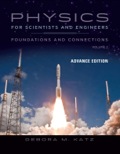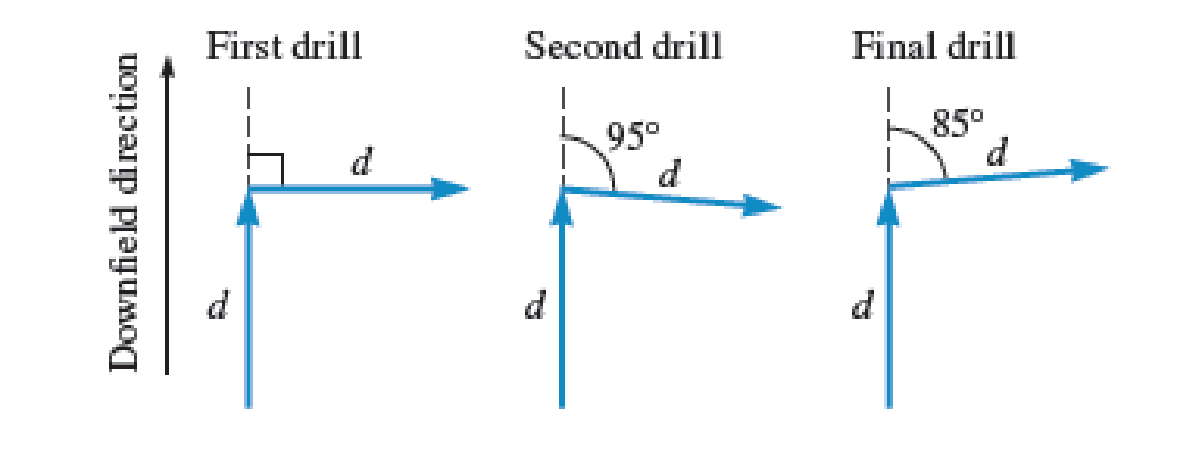
EBK PHYSICS FOR SCIENTISTS AND ENGINEER
16th Edition
ISBN: 8220100546716
Author: Katz
Publisher: CENGAGE L
expand_more
expand_more
format_list_bulleted
Concept explainers
Textbook Question
Chapter 3, Problem 17PQ
Miguel, an Ultimate Frisbee player, is running three drills (Fig. P3.17). In the first drill. Miguel runs a distance d straight down the field and then makes a 90° turn to the right, running an additional distance d. In the second drill, Miguel runs a distance d straight down the field and makes a 95° turn to the right before running an additional distance d. In the final drill, Miguel runs a distance d straight down the field and makes an 85° turn to the right before running an additional distance d.
- a. In which case did Miguel end up farthest from his starting point? In which case did he end up closest to his starting point?
- b. In which case(s) does Miguel end up farther away from his starting point than distance d?
- c. At what angle will his distance away be exactly d?

Expert Solution & Answer
Trending nowThis is a popular solution!

Students have asked these similar questions
Can someone help me
Need help on the following questions on biomechanics. (Please refer to images below)A gymnast weighing 68 kg attempts a handstand using only one arm. He plants his handat an angle resulting in the reaction force shown.A) Find the resultant force (acting on the Center of Mass)B) Find the resultant moment (acting on the Center of Mass)C) Draw the resultant force and moment about the center of mass on the figure below. Will the gymnast rotate, translate, or both? And in which direction?
Please help me on the following question (Please refer to image below)An Olympic lifter (m = 103kg) is holding a lift with a mass of 350 kg. The barexerts a purely vertical force that is equally distributed between both hands. Each arm has amass of 9 kg, are 0.8m long and form a 40° angle with the horizontal. The CoM for each armis 0.5 m from hand. Assuming the lifter is facing us in the diagram below, his right deltoidinserts 14cm from the shoulder at an angle of 13° counter-clockwise from the humerus.A) You are interested in calculating the force in the right deltoid. Draw a free body diagramof the right arm including the external forces, joint reaction forces, a coordinate system andstate your assumptions.B) Find the force exerted by the right deltoidC) Find the shoulder joint contact force. Report your answer using the magnitude and directionof the shoulder force vector.
Chapter 3 Solutions
EBK PHYSICS FOR SCIENTISTS AND ENGINEER
Ch. 3.1 - The three vectors A,B and C in Figure 3.7 all have...Ch. 3.1 - Prob. 3.2CECh. 3.1 - a. You wish to represent free-fall acceleration...Ch. 3.2 - Prob. 3.4CECh. 3.3 - Prob. 3.5CECh. 3 - A velocity vector has a magnitude of 720 m/s. Two...Ch. 3 - A young boy throws a baseball through a window. a....Ch. 3 - Prob. 3PQCh. 3 - Prob. 4PQCh. 3 - Vector A, with a magnitude of 18 units, points in...
Ch. 3 - Prob. 6PQCh. 3 - Prob. 7PQCh. 3 - The layout of the town of Popperville is a...Ch. 3 - Prob. 9PQCh. 3 - Prob. 10PQCh. 3 - Prob. 11PQCh. 3 - Prob. 12PQCh. 3 - In Chapter 5, you will study a very important...Ch. 3 - Refer to the situation described in Problem 14....Ch. 3 - Vector A has a magnitude of 4.50 m and makes an...Ch. 3 - Miguel, an Ultimate Frisbee player, is running...Ch. 3 - A baseball diamond consists of four plates...Ch. 3 - Prob. 19PQCh. 3 - Prob. 20PQCh. 3 - Two aircraft approaching an aircraft carrier are...Ch. 3 - Prob. 22PQCh. 3 - A truck driver delivering office supplies downtown...Ch. 3 - Prob. 24PQCh. 3 - Carolyn rides her bike 40.0 south of west for 5.40...Ch. 3 - Prob. 26PQCh. 3 - Prob. 27PQCh. 3 - Prob. 28PQCh. 3 - Prob. 29PQCh. 3 - Prob. 30PQCh. 3 - Prob. 31PQCh. 3 - Prob. 32PQCh. 3 - Prob. 33PQCh. 3 - Prob. 34PQCh. 3 - A firecracker explodes into four equal pieces...Ch. 3 - Prob. 36PQCh. 3 - Prob. 37PQCh. 3 - Prob. 38PQCh. 3 - Prob. 39PQCh. 3 - Figure P3.40 shows a map of Grand Canyon National...Ch. 3 - Prob. 41PQCh. 3 - The same vectors that are shown in Figure P3.6 are...Ch. 3 - A supertanker begins in Homer, Alaska, sails 125...Ch. 3 - A Three vectors are shown in Figure P3.44, but...Ch. 3 - A vector A=(5.20i3.70j) m and a vector...Ch. 3 - Prob. 46PQCh. 3 - Prob. 47PQCh. 3 - Prob. 48PQCh. 3 - An airplane leaves city A and flies a distance d1...Ch. 3 - An aircraft undergoes two displacements. If the...Ch. 3 - The resultant vector R=2AB2C has zero magnitude....Ch. 3 - A Three vectors all have the same magnitude. The...Ch. 3 - The two-dimensional vectors A and B both have...Ch. 3 - Prob. 54PQCh. 3 - Two birds begin next to each other and then fly...Ch. 3 - Prob. 56PQCh. 3 - General Problems 57. G A spider undergoes the...Ch. 3 - Peter throws a baseball through a houses window....Ch. 3 - Prob. 59PQCh. 3 - Prob. 60PQCh. 3 - Prob. 61PQCh. 3 - A glider aircraft initially traveling due west at...Ch. 3 - What are the magnitude and direction of a vector...Ch. 3 - Prob. 64PQCh. 3 - Prob. 65PQCh. 3 - Prob. 66PQCh. 3 - Prob. 67PQCh. 3 - Prob. 68PQCh. 3 - Prob. 69PQCh. 3 - Prob. 70PQCh. 3 - Vector F is proportional to vector A such that...Ch. 3 - Prob. 72PQCh. 3 - Prob. 73PQCh. 3 - Problems 74 and 75 are paired. 74. N A classroom...Ch. 3 - Prob. 75PQ
Knowledge Booster
Learn more about
Need a deep-dive on the concept behind this application? Look no further. Learn more about this topic, physics and related others by exploring similar questions and additional content below.Similar questions
- I need help with part B. I cant seem to get the correct answer. Please walk me through what youre doing to get to the answer and what that could bearrow_forwardQuestion 6: Chlorine is widely used to purify municipal water supplies and to treat swimming pool waters. Suppose that the volume of a particular sample of Cl₂ gas is 8.70 L at 895 torr and 24°C. (a) How many grams of Cl₂ are in the sample? ⚫ Atomic mass of CI = 35.453 g/mol • Molar mass of Cl₂ = 2 x 35.453 = 70.906 g/mol Solution: Use the Ideal Gas Law: Step 1: Convert Given Values • Pressure: P = 895 torr → atm PV= = nRT 1 P = 895 × = 1.1789 atm 760 • Temperature: Convert to Kelvin: T24273.15 = 297.15 K • Gas constant: R = 0.0821 L atm/mol. K Volume: V = 8.70 L Step 2: Solve for n . PV n = RT n = (1.1789)(8.70) (0.0821)(297.15) 10.25 n = = 0.420 mol 24.405 Step 3: Calculate Mass of Cl₂ Final Answer: 29.78 g of Cl₂. mass nx M mass= (0.420)(70.906) mass= 29.78 garrow_forwardE1 R₁ w 0.50 20 Ω 12 R₁₂ ww ΒΩ R₂ 60 E3 C RA w 15 Ω E2 0.25 E4 0.75 Ω 0.5 Ωarrow_forward
- What is the force (in N) on the 2.0 μC charge placed at the center of the square shown below? (Express your answer in vector form.) 5.0 με 4.0 με 2.0 με + 1.0 m 1.0 m -40 με 2.0 μCarrow_forwardWhat is the force (in N) on the 5.4 µC charge shown below? (Express your answer in vector form.) −3.1 µC5.4 µC9.2 µC6.4 µCarrow_forwardAn ideal gas in a sealed container starts out at a pressure of 8900 N/m2 and a volume of 5.7 m3. If the gas expands to a volume of 6.3 m3 while the pressure is held constant (still at 8900 N/m2), how much work is done by the gas? Give your answer as the number of Joules.arrow_forward
arrow_back_ios
SEE MORE QUESTIONS
arrow_forward_ios
Recommended textbooks for you
 University Physics Volume 1PhysicsISBN:9781938168277Author:William Moebs, Samuel J. Ling, Jeff SannyPublisher:OpenStax - Rice University
University Physics Volume 1PhysicsISBN:9781938168277Author:William Moebs, Samuel J. Ling, Jeff SannyPublisher:OpenStax - Rice University College PhysicsPhysicsISBN:9781285737027Author:Raymond A. Serway, Chris VuillePublisher:Cengage Learning
College PhysicsPhysicsISBN:9781285737027Author:Raymond A. Serway, Chris VuillePublisher:Cengage Learning Principles of Physics: A Calculus-Based TextPhysicsISBN:9781133104261Author:Raymond A. Serway, John W. JewettPublisher:Cengage Learning
Principles of Physics: A Calculus-Based TextPhysicsISBN:9781133104261Author:Raymond A. Serway, John W. JewettPublisher:Cengage Learning Physics for Scientists and Engineers: Foundations...PhysicsISBN:9781133939146Author:Katz, Debora M.Publisher:Cengage Learning
Physics for Scientists and Engineers: Foundations...PhysicsISBN:9781133939146Author:Katz, Debora M.Publisher:Cengage Learning Physics for Scientists and Engineers with Modern ...PhysicsISBN:9781337553292Author:Raymond A. Serway, John W. JewettPublisher:Cengage Learning
Physics for Scientists and Engineers with Modern ...PhysicsISBN:9781337553292Author:Raymond A. Serway, John W. JewettPublisher:Cengage Learning Physics for Scientists and EngineersPhysicsISBN:9781337553278Author:Raymond A. Serway, John W. JewettPublisher:Cengage Learning
Physics for Scientists and EngineersPhysicsISBN:9781337553278Author:Raymond A. Serway, John W. JewettPublisher:Cengage Learning

University Physics Volume 1
Physics
ISBN:9781938168277
Author:William Moebs, Samuel J. Ling, Jeff Sanny
Publisher:OpenStax - Rice University

College Physics
Physics
ISBN:9781285737027
Author:Raymond A. Serway, Chris Vuille
Publisher:Cengage Learning

Principles of Physics: A Calculus-Based Text
Physics
ISBN:9781133104261
Author:Raymond A. Serway, John W. Jewett
Publisher:Cengage Learning

Physics for Scientists and Engineers: Foundations...
Physics
ISBN:9781133939146
Author:Katz, Debora M.
Publisher:Cengage Learning

Physics for Scientists and Engineers with Modern ...
Physics
ISBN:9781337553292
Author:Raymond A. Serway, John W. Jewett
Publisher:Cengage Learning

Physics for Scientists and Engineers
Physics
ISBN:9781337553278
Author:Raymond A. Serway, John W. Jewett
Publisher:Cengage Learning
Introduction to Vectors and Their Operations; Author: Professor Dave Explains;https://www.youtube.com/watch?v=KBSCMTYaH1s;License: Standard YouTube License, CC-BY